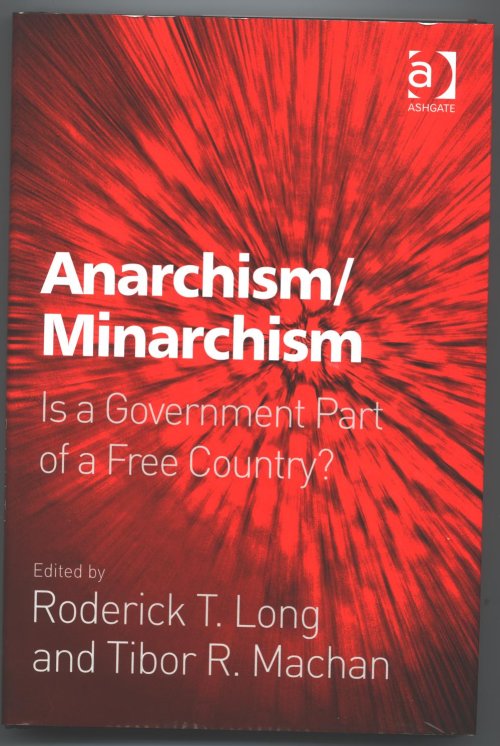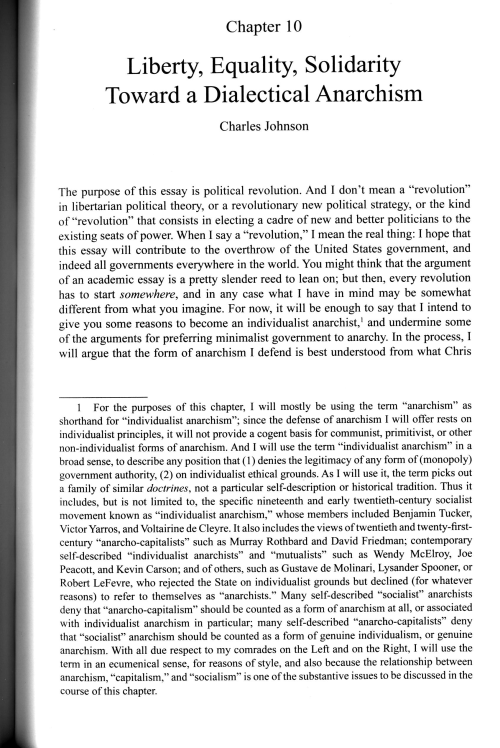Liberty, Equality, Solidarity: Toward a Dialectical Anarchism
Update 2010-03-02: The full text of Liberty, Equality, Solidarity: Toward a Dialectical Anarchism is now available online. Huzzah!
Here’s what I got in the mail Monday afternoon. It took a week longer to reach me than it did to reach Roderick; I don’t know whether that’s one of the perks of being an editor rather than a mere contributor like me, or simply because I’m way out west and he’s in Alabama.
Liberty, Equality, Solidarity: Toward a Dialectical Anarchism
The purpose of this essay is political revolution. And I don’t mean a
revolutionin libertarian political theory, or a revolutionary new political strategy, or the kind ofrevolutionthat consists in electing a cadre of new and better politicians to the existing seats of power. When I say arevolution,I mean the real thing: I hope that this essay will contribute to the overthrow of the United States government, and indeed all governments everywhere in the world. You might think that the argument of an academic essay is a pretty slender reed to lean on; but then, every revolution has to start somewhere, and in any case what I have in mind may be somewhat different from what you imagine. For now, it will be enough to say that I intend to give you some reasons to become an individualist anarchist,1 and undermine some of the arguments for preferring minimalist government to anarchy. In the process, I will argue that the form of anarchism I defend is best understood from what Chris Sciabarra has described as a dialectical orientation in social theory,2 as part of a larger effort to understand and to challenge interlocking, mutually reinforcing systems of oppression, of which statism is an integral part—but only one part among others. Not only is libertarianism part of a radical politics of human liberation, it is in fact the natural companion of revolutionary Leftism and radical feminism.My argument will take a whole theory of justice—libertarian rights theory3—more or less for granted: that is, some version of the
non-aggression principleand the conception ofnegativerights that it entails. Also that a particular method for moral inquiry—ethical individualism—is the correct method, and that common claims of collective obligations or collective entitlements are therefore unfounded. Although I will discuss some of the intuitive grounds for these views, I don’t intend to give a comprehensive justification for them, and those who object to the views may just as easily to object to the grounds I offer for them. If you have a fundamentally different conception of rights, or of ethical relations, this essay will probably not convince you to become an anarchist. On the other hand, it may help explain how principled commitment to a libertarian theory of rights—including a robust defense of private property rights—is compatible with struggles for equality, mutual aid, and social justice. It may also help show that libertarian individualism does not depend on an atomized picture of human social life, does not require indifference to oppression or exploitation other than government coercion, and invites neither nostalgia for big business nor conservatism towards social change. Thus, while my argument may not directly convince those who are not already libertarians of some sort, it may help to remove some of the obstacles that stop well-meaning Leftists from accepting libertarian principles. In any case, it should show non-libertarians that they need another line of argument: libertarianism has no necessary connection with thevulgar political economyorbourgeois liberalismthat their criticism targets.The threefold structure of my argument draws from the three demands made by the original revolutionary Left in France: Liberty, Equality, and Solidarity.4 I will argue that, rightly understood, these demands are more intertwined than many contemporary libertarians realize: each contributes an essential element to a radical challenge to any form of coercive authority. Taken together, they undermine the legitimacy of any form of government authority, including the
limited governmentimagined by minarchists. Minarchism eventually requires abandoning your commitment to liberty; but the dilemma is obscured when minarchists fracture the revolutionary triad, and seeklibertyabstracted from equality and solidarity, the intertwined values that give the demand for freedom its life, its meaning, and its radicalism. Liberty, understood in light of equality and solidarity, is a revolutionary doctrine demanding anarchy, with no room for authoritarian mysticism and no excuse for arbitrary dominion, no matter howlimitedor benign. . . .1. For the purposes of this essay, I will mostly be using the term
anarchismas shorthand forindividualist anarchism;since the defense of anarchism I will offer rests on individualist principles, it will not provide a cogent basis for communist, primitivist, or other non-individualist forms of anarchism. And I will use the termindividualist anarchismin a broad sense, to describe any position that (1) denies the legitimacy of any form of (monopoly) government authority, (2) on individualist ethical grounds. As I will use it, the term picks out a family of similar *doctrines*, not a particular self-description or historical tradition. Thus it includes, but is not limited to, the specific nineteenth and early twentieth-century socialist movement known asindividualist anarchism,whose members included Benjamin Tucker, Victor Yarros, and Voltairine de Cleyre. It also includes the views of twentieth and twenty-first-centuryanarcho-capitalistssuch as Murray Rothbard and David Friedman; contemporary self-describedindividualist anarchistsandmutualistssuch as Wendy McElroy, Joe Peacott, and Kevin Carson; and of others, such as Gustave de Molinari, Lysander Spooner, or Robert LeFevre, who rejected the State on individualist grounds but declined (for whatever reasons) to refer to themselves asanarchists.Many self-describedsocialistanarchists deny thatanarcho-capitalismshould be counted as a form of anarchism at all, or associated with individualist anarchism in particular; many self-describedanarcho-capitalistsdeny thatsocialistanarchism should be counted as a form of genuine individualism, or genuine anarchism. With all due respect to my comrades on the Left and on the Right, I will use the term in an ecumenical sense, for reasons of style, and also because the relationship between anarchism,capitalism,andsocialismis one of the substantive issues to be discussed in the course of this essay. !!!@@e2;2020;a9;2. See Chris Matthew Sciabarra (2000), Total Freedom: Toward a Dialectical Libertarianism. See also Sciabarra 1995a and 1995b. !!!@@e2;2020;a9;
3.
Libertarianismas discussed in this essay is a theory of political justice, not as a position on the Nolan Chart.Small governmenttypes who speak kindly of economic freedom or civil liberties may or may not qualify aslibertariansfor the purpose of my discussion. Those who treat liberty as one political good that must be balanced against other goods such as social stability, economic prosperity, democratic rule, or socioeconomic equality, and should sometimes be sacrificed for their sake, are unlikely to count. Since they are not committed to the ideal of liberty as a principled constraint on *all* political power, they are no more likely to be directly convinced by my arguments than progressives, traditionalists, communists, etc. !!!@@e2;2020;a9;4. Of course, the male Left of the day actually demanded fraternité,
brotherhood.I’ll speak ofsolidarityinstead ofbrotherhoodfor the obvious anti-sexist reasons, and also for its association with the history of the labor movement. There are few causes in America that most twentieth-century libertarians were less sympathetic to than organized labor, but I have chosen to speak ofthe value of solidarity,in spite of all that, for the same reasons that Ayn Rand chose to speak ofthe virtue of selfishness:in order to prove a point. The common criticisms of organized labor from the twentieth-century libertarian movement, and the relationship between liberty and organized labor, are one of the topics I will discuss below.!!!@@e2;2020;a9;— Liberty, Equality, Solidarity: Toward a Dialectical Anarchism in Roderick T. Long and Tibor Machan (eds.), Anarchism/Minarchism: Is a Government Part of a Free Country. Ashgate Press, ISBN 978-0-7546-6066-8. 155–157.
The good news, for those whose interest is piqued and who would like to read the whole thing, is that the book is now available for pre-ordering and will be shipped somewhere around the end of the month. The bad news is that it’s about $80.00 for the hardcover edition, which is, for the time being, the only edition there is. (If you’re interested in reading the essay but are unlikely to have the bread to buy the book anytime soon, contact me privately.) In any case, for those who do get a chance to read the essay, I’d be glad to hear what you think, or any questions you may have, in the comments section at this post.
I mention this in the essay, but I’d like to repeat it here while I have the chance: the debts I accumulated in the process of writing this essay, and the earlier work on which it drew, are too numerous to give an accounting of them all, but I would especially like to thank my companion Laura and my teacher Roderick. The essay would have been much the poorer, or simply nonexistent, without their patience, inspiration, collaboration, encouragement, and detailed and very helpful comments


